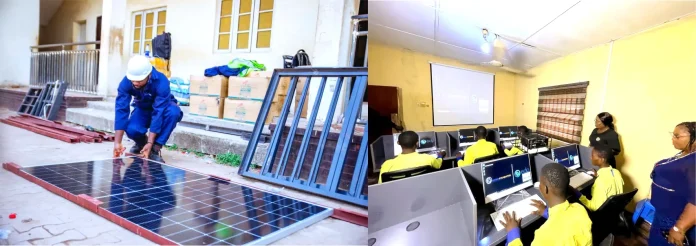By Charles Emeni
RETECH Foundation, in collaboration with EDP, is set to install an 8.6 kWh solar power system in 10 public secondary schools each, six in Delta State and four in Edo State. Each solar system is expected to provide reliable energy to power fans, lighting (for both classrooms and night-time security), ICT laboratories, and water systems.
The system will support up to 30 computers simultaneously, ensuring continuous electricity access for both educational and community use. Importantly, the schools’ water systems will also serve nearby communities free of charge, improving access to clean water.
This was disclosed to The Pointer by the Chairman, RETECH Foundation, Engr. Ronye Egborge, who noted that, in order to make it a reality, Partner organizations would donate the computers, powered by the solar systems, and also contribute old but functional devices.
This he said, would not only reduce electronic waste but also give the computers a second life in advancing education in the benefitting schools. The project, he further disclosed, is targeted at ensuring long-term access to clean energy, potable water, and quality ICT education, while teachers will also receive hands-on ICT training to strengthen their capacity to deliver practical and technology-driven learning.
He expressed appreciation to EDP for collaborating with RETECH Foundation on what he called “deeply impactful project”.
The Power2Schools Phase 2 project, he said, was more than an energy intervention, but an investment in the future of thousands of young people across Edo and Delta States.
‘By providing sustainable power, access to clean water, and robust ICT education, we are removing barriers that keep children trapped in cycles of poverty and limited opportunity. This project directly supports our vision and mission at RETECH Foundation, to reduce poverty and hunger by increasing access to, and the quality of lifelong education.
‘’When students learn in a powered classroom, when teachers can teach with modern tools, and when communities have access to clean water, we create an enabling environment where education truly thrives. Our work here lays the foundation for improved skills, better livelihoods, and stronger, more resilient communities,” Engr Egborge stated.
Speaking on the specific expected results of the project, Engr. Egborge listed, among others: Clean, reliable, and sustainable energy in 10 previously energy-excluded schools; fully functional STEM/ICT laboratories with 30 laptops per school (300 total); ICT training and digital skills development for teachers and students.
Others, he said were: Consistent and reliable access to water for the schools and surrounding communities; WASH (Water, Sanitation, and Hygiene); sensitization for students and communities; operations and maintenance training for long-term sustainability and improved quality of education and enhanced digital literacy.
Also listed as expected benefit were the strengthening of employability and entrepreneurship skills among students; increased access to clean water for drinking, cooking, and cleaning; improved sanitation and hygiene, and reducing waterborne diseases such as typhoid.
In order to kick the ball rolling, he disclosed that, RETECH Foundation was expecting approximately 45,000 direct beneficiaries and 60,000 indirect beneficiaries, while a total of 86 kWh of solar energy capacity would be installed across the 10 schools.


